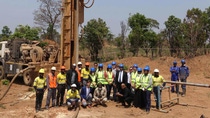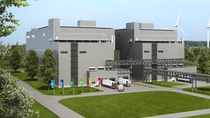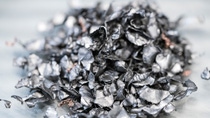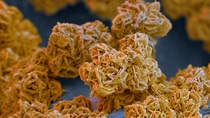Change for climate
Our Innovations
Sourcing
Loving EVs means respecting our sources
At BASF we know that the way metals are sourced for electric vehicle (EV) battery materials is a crucial factor in the very sustainability of EVs themselves.

That’s why, together with our partners, local mining cooperatives, and government authorities, we’ve embraced a series of global initiatives to improve working conditions for miners. We’re a founding member of the Global Battery Alliance (GBA). The GBA is dedicated to fostering sustainable and responsible supply chains that both generate sustainable employment and help to achieve the goals set by the Paris Climate Agreement.
Metals such as nickel and cobalt are essential to support strong growth in the global EV value chain and we work to manage the impact of sourcing these metals in the best possible way. Each supply chain is assessed for sustainability and we strive to ensure that environmental, social and human rights standards are respected. Where additional governance is needed, supply chains are covered by comprehensive third-party certification, such as the Initiative for Responsible Mining Assurance scheme, which is co-governed by NGOs, industry, communities and labor unions.
More about BASF's battery materials business and sustainability
Production
Love EVs. Don’t love carbon footprint.
Producing EV battery materials can take a lot of energy. We’re reducing the CO₂ footprint by using more energy-efficient processes, more renewable energy and shorter transportation routes.

Thanks to our innovative production plants for precursors in Harjavalta, Finland and cathode active materials in Schwarzheide, Germany, we are manufacturing cathode active materials in a way that reduces the carbon footprint by up to 40% compared to the industry benchmark.
BASF will be the first cathode active materials supplier with production capacity in all major markets. Cathode active materials are the chemicals that help “power” the batteries of electric vehicles. Because we have production assets and R&D teams in all the main markets, including Asia, Europe and North America, we can support our customers with tailor-made solutions ready to meet the requirements of local governments and respond to the global demand for electric vehicles. In fact, in a recent development, BASF and Shanshan – a leading lithium-ion battery materials supplier – have formed a joint venture serving the world’s largest battery materials market, China.

Recycling
Metals we can’t bear to part with
Together with our partners, we’re working on innovative ways to make sure the essential metals needed to keep your electric vehicle’s wheels turning are here to stay.

The innovative recycling process we use recovers valuable metals extracted from phased-out EV batteries and battery production scrap at a world-leading rate. By recycling these metals, we are able to save primary resources as well as reduce CO₂ emissions.
We’re building a new prototype battery recycling plant at Schwarzheide in Germany that can extract a range of essential metals such as lithium, cobalt and manganese, bringing them back to life for use in new batteries. It’s a huge step in closing the loop when it comes to creating more sustainable electric vehicles.

Research
It's a passion project
We’re always testing novel materials, innovative recycling solutions and leading process technologies to improve our CO₂ footprint. We’ll leave no stone unturned in making EV battery materials even more sustainable.

BASF is developing advanced cathode materials for batteries, which consist of tiny particles that are just micrometers in size.
Our global R&D teams work tirelessly to improve the performance of battery materials. Their advances are aimed at helping the real driving range of a typical midsize car jump to 600km, while reducing the charging time to 15 minutes.
We’re also researching how cobalt can be removed from electric vehicle batteries, or at least dramatically reduced. To that end, we’re exploring how cutting-edge lab research can be scaled up to production level.
In addition to R&D on cathode active materials for lithium-ion batteries, we are working on components for next-generation batteries. These include solid-state batteries in which the electrolyte is solid rather than liquid and the anode is lithium rather than graphite based. This will bring considerable improvements in safety and will take up less space in the car.
Partnering with universities, academic institutions and private partners, our finger is on the pulse of scientific advances when it comes to promising novel and improved materials. One example of our collaboration network is BELLA (Battery and Electrochemistry Laboratory), a joint laboratory of BASF and the Karlsruhe Institute of Technology in Germany.



